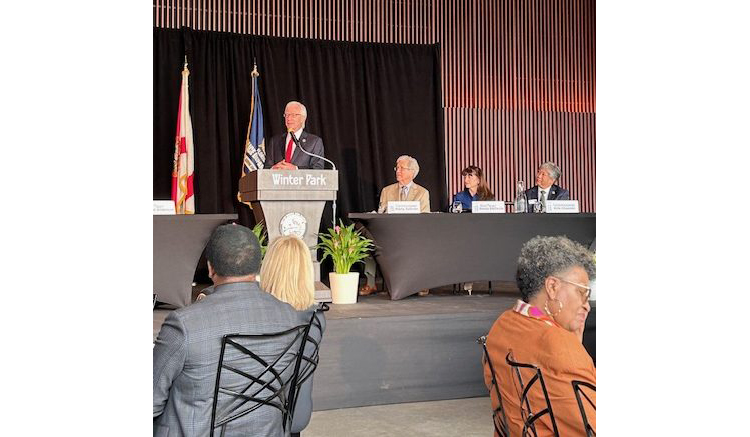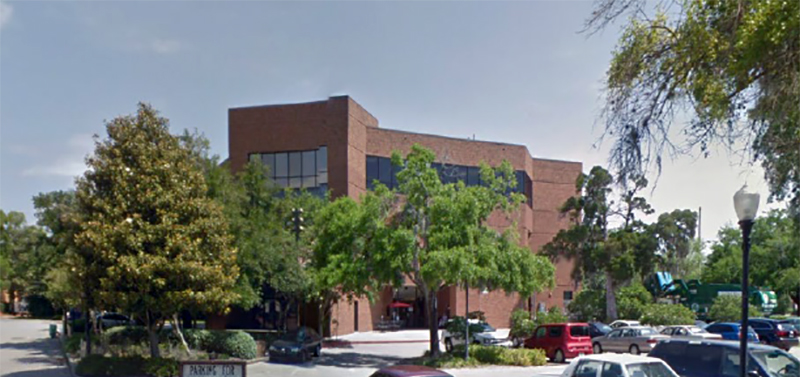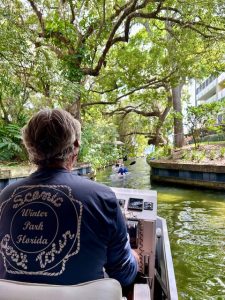
by Beth Kassab | Jun 19, 2024 | City Commission, News, Zoning and Development
Former Mayor Phil Anderson will lead new design board
The committee formed by Mayor Sheila DeCiccio will set aesthetic standards for new development in key corridors
June 19, 2024
By Beth Kassab
Former Mayor Phil Anderson will lead the new Design Guidelines Committee appointed to set the tone for new development within the districts along Park Avenue, Morse Boulevard and Orange Avenue.
The group met for the first time on Monday and Anderson noted how a number of recent projects leading up to the end of his term in April showed the need for clear standards.
A proposal by Rollins College to build faculty apartments along New England Avenue, for example, has undergone a number of revisions and architectural changes and still doesn’t have approval.
“There was a feeling that the applicant didn’t know how to view compatibility,” Anderson said. “One of the thoughts was let’s clarify what we mean and create less anxiety for some of applicants … take some of the mystery out of it about what the elected officials opinions were of what the residents want to see.”
As the new board is starting its work, the city is also in the process of hiring a town architect who will work closely with the group.
Planning & Zoning Director Allison McGillis noted that some of the guidelines haven’t been updated since 2010.
Mayor Sheila DeCiccio tasked the board with updating standards for the Central Business District, which includes Park Avenue and Hannibal Square; the Orange Avenue Overlay and Morse Boulevard.
The group will consider architectural design, building setback and other standards. Other rules such as limitations on building height are already spelled out in city code.
The other members of the board are Charley Williams, who will serve as vice chairman; Deborah Ziel; Maurizio Maso; Emily Williams and Lucy Boudet.
To start, the group plans to meet for six months, but the time will be extended if their work is not completed.
WinterParkVoiceEditor@gmail.com
Beth Kassab is editor of the Voice.
To comment or read comments from others, click here →

by Beth Kassab | Jun 19, 2024 | City Commission, Library, News, Zoning and Development
Performing arts center wins old library building lease over Rollins museum
Blue Bamboo Center for the Arts looks to fill Winter Park’s lack of live music venues
June 19, 2024
By Zoey Thomas
The Winter Park City Commission approved a proposal to turn the former public library building into a multi-cultural performing arts venue in a 4-1 vote last week. Blue Bamboo Center for the Arts won over a competing bid from Rollins College, which hoped to use the space for a new art museum.
Mayor Sheila DeCiccio cast the lone vote for Rollins – the latest twist in a more than two-year saga over the fate of the old library that has seen multiple proposals fizzle from several community groups.
Winter Park already has 18 visual arts museums, said Blue Bamboo managing director Chris Cortez in his presentation to the commissioners. But Blue Bamboo is just the second performing arts venue in the city, alongside the Winter Park Playhouse, he said.
“Our city’s presence in the performing arts is small and shrinking,” Cortez said. “Not only will citizens of Winter Park pay to see live entertainment, if they don’t have it in Winter Park, they will go to Orlando, and they will give money to the Orlando businesses.”
Cortez founded Blue Bamboo alongside his wife, Melody Cortez, in 2016. For seven years, the nonprofit hosted local and touring performers in a 100-seat converted warehouse on Kentucky Avenue. Blue Bamboo closed the Kentucky Avenue space in December due to rent increases and has been looking for a new building for the past six months.
Blue Bamboo first expressed an interest in the old library building to the City Commission in late May as Rollins came forward with details for the museum plan. Last week, Cortez expanded on his two-phase plan for the building.
In phase one, lasting until August 2027, Blue Bamboo plans to open the first floor for concert events, meetings, rehearsals and recording space. Blue Bamboo would then kick off phase two by opening the remaining two floors.
Plans for the second floor include seven teaching studios. Central Florida Vocal Arts and Winter Park Chamber Music Academy have both expressed interest in leasing space, Cortez said.
Blue Bamboo also plans to share the space with other organizations. The third floor would be mostly leasable office, rehearsal and meeting spaces. Both floors would include galleries to hang visual art.
“The tiny irony of this is not lost on me — according to our proposal, our opponents, Rollins, could apply to use the space for a nominal fee anytime they wanted,” Cortez said. “Any arts organization could. Any artist could.”
During its proposed 40-year lease, Blue Bamboo suggested paying $132,000 in annual rent during phase one and $276,000 during phase two — with a 2% increase every five years.
Before last week, Rollins College appeared as the frontrunner to secure the building lease. Rollins proposed a $275,000 annual rent with an increase every 10 years based on the average increase during the prior lease period.
Rollins has been looking to expand its art museum for several years. Previously, the college planned to build a new Rollins Museum of Art on the Lawrence Center Property down the street from the Alfond Inn. But the college hasn’t been able to raise enough money for the pricey Lawrence Center project, and moving into the old library would be a cheaper option.
“Rollins is looking at this after three and a half, four years of screwing around trying to build a building that this council approved,” said Allen Ginsburg, a former Rollins trustee who gave a presentation to the commissioners on the college’s behalf. “They don’t have the money for it. They can’t raise the money, they’ve raised about half the money.”
Moving into the old library building might be Rollins’ only option to get out of its current space, and it would be a shame to deny them that opportunity, he said.
Unlike Blue Bamboo, Rollins proposed undertaking all renovations in one phase. It would also build a one-story gallery annex between the Alfond Inn and library building, architect Rob Schaeffer told the Commission.
Rollins Vice President for Communications Sam Stark said the college would now continue to pursue its original plan to build a new museum.
“We felt obliged to honor the request of the city to submit a proposal for the old library,” he said in an email. “Though our proposal was a better financial offering, the City Commission chose to pursue another route. We hope it goes well for all parties. We are laser-focused on raising the funds to proceed with our approved project on the Lawrence Center property.”
After the most recent attempt by the city to solicit proposals for the old building failed, DeCiccio said she approached Rollins about the art museum concept.
She was the only vote in support of the plan last week, arguing it was more financially feasible, is less likely to cause parking headaches and would attract more daytime business for nearby retail shops.

A rendering shows how the old Winter Park Library could be converted into an art museum for Rollins College.
DeCiccio expressed doubts Blue Bamboo had enough funds to address renovations needed to the old library building.
The library needs to replace two of its four air-conditioning units, which would take $211,000 to address on the first and second floors alone, said DeCiccio, citing a city report. The elevator also needs a full replacement, she said.
“Blue Bamboo has no consistent funding source,” she said. “The city contributes $11,000 to them every year, which they still need … I’m concerned about the long-term maintenance of the building.”
Blue Bamboo’s expenses exceeded its income by over $170,000 in 2022, according to its tax filings.
The deficit occurred after Blue Bamboo received a $240,000 Shuttered Venue Operators Grant halfway through 2021 to help out after the pandemic, said Cortez. Blue Bamboo had to spend the money received by the end of 2022.
The venue spent all its grant money to pay performers by the end of the year, before the money could be revoked, he said. The funding saved the business, but it also had the unintended consequence of leaving “red ink” in the budget. Blue Bamboo posted over $166,000 in positive net income the year prior — 2021, when the grant was received.
DeCiccio also said Blue Bamboo would draw large, late-night crowds and parking issues that could deter the nearby residential area. Blue Bamboo, for its part, emphasized its shows will end by 10 p.m. and building usage will be scheduled around parking capacity.
Vice Mayor Todd Weaver gave a more optimistic picture of Blue Bamboo’s financial necessities. As an engineer with a general contractor license, Weaver assessed the library building over several visits, including some with the fire marshall, he said. He presented his findings to the commission in an inspection report.
“Normally what I would do is, I would take pictures of defects and show it to the client, but there are so few defects in this building that I didn’t really think it was necessary,” he said.
The building is generally in good shape, with no observable plumbing or electrical defects, and the elevator could be rehauled fairly cheaply, he said, estimating the cost at $175,000. Weaver expressed confidence Blue Bamboo had the overhead necessary to complete the renovations.
Cortez said Blue Bamboo has access to up to $800,000 for first-floor renovations alone.
Funding comes from a mixture of pledged donations from a private donor and several board members, said Cortez.
Performing Arts Matter, a Maitland-based performing arts non-profit, is listed as a co-tenant alongside Blue Bamboo. Its president, Jeff Flowers, is a board member of Blue Bamboo and pledged $100,000 for the project.
More than 20 people spoke at the meeting, most in favor of Blue Bamboo. Jack Graham, a Winter Park resident who performed frequently at Blue Bamboo with his group Jack Graham & Friends, fought tears while praising the venue.
“In my time at the Blue Bamboo, I saw, not customers or patrons at a venue, I saw a family and a home,” he said. “A little venue created at a street behind the Lombardi’s … think of the power and the contribution that could be made in the library location by a venue with that much to share.”
The lease is expected to go before the City Commission for approval next week.
WinterParkVoiceEditor@gmail.com
Zoey Thomas is a rising junior at the University of Florida and a graduate of Winter Park High School. She is studying media production and statistics and her work has been published in The Independent Florida Alligator. When in her hometown of Maitland, Zoey enjoys catching up with her pets and visiting her favorite sushi restaurant. Please welcome Zoey as the Voice’s summer reporting intern.
To comment or read comments from others, click here →

by Beth Kassab | May 24, 2024 | City Commission, News, Uncategorized
Commissioners approve Storyville Coffee and more Christmas lights, but reject canal murals
The board also decided to hire a town architect
May 23, 2024
By Beth Kassab
City Commissioners approved plans for a new building known as the Storyville Coffee project and doubled the public budget for Christmas lights, but rejected a proposal to paint murals to the canal bridges that connect the city’s famous chain of lakes.
The Storyville Coffee project from Full Sail founder Jon Phelps won unanimous approval by the board after a redo of its design to blend more closely with the surrounding Central Business District. The building on South Knowles Avenue will top 11,000 square feet and contain offices and a residence on the second and third floors.
Christmas lights
Commissioners this week also welcomed plans by the Park Avenue District to expand the city’s Christmas display, pledging another $50,000 from the general fund and what will likely be an additional $50,000 from the Community Redevelopment Agency Fund. The portion from the CRA board won’t be finalized until a later meeting of that board.
The new expenditures will come on top of the $96,000 already in the city budget for holiday decor.
The nearly $200,000 total commitment doubles the city’s expenditure on Christmas decorations and the newest portion will be provided as a match of up to $100,000 raised privately by the district.
The idea is for the display at Central Park and Park Avenue along with Hannibal Square and Morse Boulevard to be more immersive and attract more visitors to shop and dine in the area. A sample mood board for the additions includes lots more lights, magnolia flowers and oranges and immersive light experiences such as archways.
Canal Murals
Commissioners gave a thumbs down to an idea from the Public Art Advisory Board to commission artists to paint murals under the canal bridges that connect the Chain of Lakes.
The canals pose too harsh an environment for art, several commissioners said.
“I love murals, but they have to be put in the right place,” Weaver said. “This is kind of a nasty environment for fine artwork.”
Commissioner Craig Russell said he loved the idea and made a motion to pursue the murals, but it failed for lack of a second from another commissioner.
Town Architect
Winter Park will hire a town architect, likely as a contracted role to be called on as needed.
Former Mayor Phil Anderson, who just left his post in April, attended the meeting to support the idea.
“I think it’s probably time for winter park to join Charleston or Carmel who have an expert available,” Anderson said.
The discussion of creating the new position comes as Mayor Sheila DeCiccio is finalizing a board to set design guidelines for the key business districts along Park, Orange and Fairbanks avenues. She noted the number of large projects coming up for approval and the need for additional eyes to help
Russell expressed skepticism about the need for the role.
“What are the unintended consequences of adding another chef to the kitchen?” he asked.
Commissioner Kris Cruzada said he supported the idea in an effort to maintain the aesthetic of the city.
“There’s a look and feel and we may need to have someone on board to protect that look and feel going forward,” he said.
WinterParkVoiceEditor@gmail.com
To comment or read comments from others, click here →

by Beth Kassab | May 23, 2024 | City Commission, Library, News, Uncategorized, Zoning and Development
Rollins makes pitch to turn old library into art museum
The college wants to add 5,000 square feet to the building rather than pursue earlier plans for new construction
May 23, 2024
By Beth Kassab
Officials from Rollins College along with developer and philanthropist Alan Ginsburg made a pitch on Thursday to take over the old city library building and turn it into the college’s art museum complete with an auditorium, educational space and a 5,000-square-foot addition.
The conversation took place Thursday at a work session among city commissioners, who have tried for years to find a suitable use for the old brick building, including two failed requests for proposals.
Rollins President Grant Cornwell, who announced his retirement earlier this year, said the college was willing to shelve more expensive plans for new construction, the latest version of which were approved by the commission last year.
Cornwell said encouragement from Mayor Sheila DeCiccio and Ginsburg as well as a fundraising shortfall toward the $30 million for the new construction all weighed into the college’s decision to consider the old building.
“The first reason we’re here is because the mayor asked us,” he said. “… If this all came together and we could repurpose the building, that’s something we have to take seriously.”
He said donors have committed about $18 million to the project, which may cover the cost of renovating the old library and would allow a new museum to open much sooner than if the college pursued all new construction.
Ginsburg, a former Rollins trustee who has helped the college develop several projects, called himself a “pro bono developer” on the proposal and pushed for the change in plans after he was approached to help finish fundraising for the more expensive version of the project.
City commissioners appeared largely open to the idea and agreed to allow City Manager Randy Knight to begin negotiations with Rollins, which would prefer to buy the land from the city, along with several other groups that have recently expressed interest in the building.
The concept will appear for more formal discussion at the next City Commission meeting in June.
The Blue Bamboo Center for the Arts, a nonprofit music venue, recently lost its lease in Winter Park and also expressed interest in repurposing the old library into a music venue and teaching space. Jeff Flowers, a former Maitland city commissioner and chairman of the Blue Bamboo’s board, also gave a short presentation at the work session.
Commissioner Todd Weaver said the Orlando Opera as well as another group has also expressed interest in the building since the last request for proposal from the city yielded just one response.
WinterParkVoiceEditor@gmail.com
To comment or read comments from others, click here →

by Beth Kassab | May 18, 2024 | City Commission, News
Also on the agenda: More Christmas lights, canal murals, town architect
The City Commission will consider several measures to maintain or enhance Winter Park’s aesthetic
May 16, 2024
By Beth Kassab
The City Commission on Wednesday will consider how to add to the annual Christmas display in the Central Business District.
The $300,000 proposal from the Park Avenue District includes $200,000 from city funds and another $100,000 from fundraising by the district, according to a staff memorandum. About $100,000 is already included in the upcoming city budget.
A sample mood board for the additions includes lots more lights, magnolia flowers and oranges and immersive light experiences such as archways.
Commissioners will discuss the proposal and give guidance for the next steps.
Canal murals
The Public Art Advisory Board will ask for direction on a proposal to commission artists to paint murals along the Chain of Lakes’ canals, a well-known attraction on the Scenic Boat Tour.

One of the canals that connects the Winter Park Chain of Lakes can be enjoyed by passengers on the Scenic Boat Tour.
The idea would be to add the art along the sides of the Venetian-style canals that connect the city’s famous lakes.
Still to be determined are the logistics and price of such an installation. A staff memorandum estimated the cost at about $20 to $30 per square foot for the concept that came from the city’s Natural Resources and Sustainability Division.
City commissioners will discuss their appetite for the project.
Town architect
Should the city hire an architect to help ensure developers are keeping new buildings compatible with the old?
Commissioners will consider whether to put such a position out to bid on Wednesday as the group also makes appointments to a new advisory group that will help set design standards for Winter Park’s commercial areas.
“Compatibility is crucial to preserving the charm of Winter Park,” a staff memorandum reads. “The City has facade guidelines
for our most important architectural corridors (i.e. Morse Boulevard, Orange Avenue, and the Central Business District) but approving designs that are “compatible” with the existing buildings and the community vision is often challenging.”
A town architect would assist planners in determining whether a development proposal works within the existing neighborhood. No cost information was provided in the memorandum.
WinterParkVoiceEditor@gmail.com
To comment or read comments from others, click here →

by Beth Kassab | May 18, 2024 | City Commission, News, Uncategorized
Full Sail founder looks to bring Storyville Coffee concept to Winter Park
The Seattle-based company owned by Jon Phelps also occupies a spot at Pike Place Market
May 17, 2024
By Beth Kassab
A founder of Full Sail University is seeking approval to develop a three-story building just off Park Avenue to be anchored by Storyville Coffee, a concept he started on the west coast.
Jon Phelps, who declined to be interviewed for this story through Zane Williams of Z Properties, a design-build company, started Storyville Coffee and operates a mail business and two locations, according to the company’s website.
The coffee shop will occupy the first floor for the building proposed at 111 S. Knowles Avenue, which is owned by a corporation with the same address as Full Sail.
City commissioners will consider the 11,289-square-foot project on Wednesday. The second floor would contain office space and the third floor would serve as a residence.
Storyville Coffee was mentioned last year in the Seattle Times for serving the city’s most expensive latte at $8.50 — or $10.37 after tax and a $1 tip is included.
The story said the coffee concept was founded in 2006 by a group associated with the Seattle-area evangelical megachurch Mars Hill, which was disbanded in 2015. Phelps served as a member of Mars Hill’s board. He is the manager of Storyville Coffee, which filed with the Florida Division of Corporations in 2009 and also lists the same address as Full Sail, according to documents on the division’s site.
The development is proposing 14 parking spaces, which would accommodate both the commercial and residential uses, according to a city staff memorandum. The parking is in line with what was offered by the previous tenant at the property the Imperial at Washburn Imports.
Staff is recommending that the proposed tenant and any future tenants comply with the city’s noise ordinance, including no outdoor speakers or live entertainment on the patio.
WinterParkVoiceEditor@gmail.com
To comment or read comments from others, click here →








Recent Comments